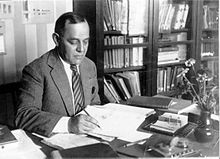Arthur Biram

Arthur Yitzhak Biram (
Biography
Arthur Biram was born in
Biram was one of the founders of the Bar-Kochba club and a member of the German liberal religious stream 'Ezra', which recognized the importance of high school education. In 1913, he settled in Ottoman Palestine.
Biram married Hannah Tomeshevsky, with whom he had two sons. His son Aharon died in an accident while on reserve duty, and Binyamin, an engineer at the Dead Sea Works, was killed by a land mine.
Pedagogic career

Biram founded the Hebrew Reali School in Haifa in 1913 and was appointed its first principal.[3] When World War I broke out, Biram was drafted by the German army and stationed in Afula. In 1919, he returned to school.
As part of Biram's philosophy of education, in 1937 he implemented compulsory Hagam[4] training for girls in the Hebrew Reali School in Haifa, laying the foundation for recruitment of women in the Haganah, and later the Israel Defense Forces.
In 1948, he resigned his post as principal, and on his 75th birthday, he authored a collection of essays on the Bible. Altogether, he wrote about 50 publications in Hebrew, German, English, and Arabic. Biram died in Haifa in 1967.
Awards and recognition
In 1954, he was awarded the Israel Prize for education.[5]
See also
References
- ^ "The Hunters of Lost Books: New Project Finds and Digitizes Books Looted in WWII". Haaretz. Retrieved 2024-02-08.
- ^ Die atomistische Substanzenlehre aus dem Buch der Streitfragen zwischen Basrensern und Bagdadensern, Arthur Biram, dissertation
- ^ The Hebrew Reali School in Haifa Archived March 8, 2014, at the Wayback Machine
- ^ Haganah, written by Dganit Boni-Davidi (acronym for Expanded Physical Education)
- ^ "Israel Prize recipients in 1954 (in Hebrew)". Israel Prize Official Site. Archived from the original on March 7, 2012.
Further reading
- Socio-Educational Dilemmas: a typology illustrated by the history of Hebrew education in Haifa during the British Mandate, by Yuval Dror, article in the Journal of Educational Administration and History, 1478-7431, Volume 26, Issue 1, 1994, Pages 35 – 54,
- Encyclopedia of Zionism and Israel, by Raphael Patai, Vol. 1, Herzl Press, 1971
- Uwe Fiedler: Er gründete in Haifa eine Schule. BoD – Books on Demand, 2017 (in German)
- Streetwise: Rehov Biram, Haifa, written by Wendy Blumfeld
- Publications about resp. by Arthur Biram at WorldCat
- Biography at the Upper Lusatian Science Society (archived, in German)
